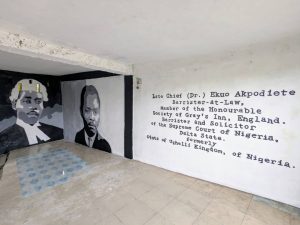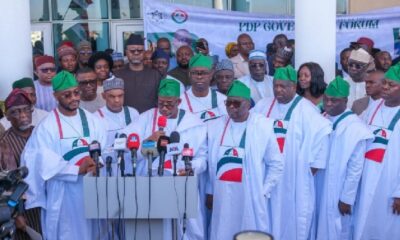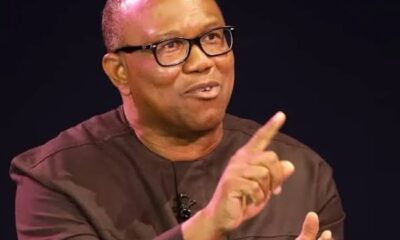Opinion
A MINISTER’s TEMPEST AND TELECOMS SURVIVAL

By Sonny Aragba-Akpore.
The new “National Digital Economy and E-Government bill “ maybe an albatross described in Samuel Taylor Coleridge,s “The Rime of the Ancient Mariner”.And as Coleridge puts it in his master piece “Water,water everywhere,but nor to drink”.That is the irony with our situation now.
And the Minister of Communications, Innovation and Digital Economy, Bosun Tijani thought differently when he boasted two weeks ago that the new bill when enacted was capable of revolutionizing the nation’s economy with a projected revenue of $18.3 billion by the turn of 2026.
> But this appears to be a mere projection and perhaps a gamble at best.
> Does the Minister know that like most things and people within a troubled economy, telecommunications is also troubled?
And at a time when spirited efforts are needed to cushion the troubles, should a Minister be in hot pursuit of a new law that he claims will boost the economy by about $18.3 billion by 2026?.There may be other reasons for this new bill other than what we know.
Perhaps he thinks foisting a new law on the sector which at best would create multiple layers of regulations and more burden for the operators will make a positive difference?
But stakeholders are worried that a brazen law ,which is viewed as self serving,is the least needed now especially when foreign direct investments and investors are scared stiff about bringing in their money to a wobbling economy.
The new bill, if translated to an Act, is a potential albatross that will hang menacingly on the necks of everybody including the Minister.
These fears were made very clear last week in Lagos when stakeholders gathered to review the sector and its needs and concluded that there are bigger headaches than bringing in a new law now.
It was lamentation all the way and no one saw any light at the end of the tunnel.
Even those who were austere with their words couldn’t keep their characteristic cool anymore.We are all victims of poor network services and the operators claim to be helpless citing several reasons especially paucity of funds due to declining investments and recorded losses among others.
> But despite the Minister,s obsession to push this bill down the throats of everybody including the legislators,there are more troubling days ahead the telecommunications industry.
> At the Lagos gathering last week, Bolaji Balogun, a pioneer telecommunications revolution leader and one of the original promoters of Econet Wireless Nigeria ( now Airtel after several name changes), who worked side by side with Strive Masiyiwa at the Digital Mobile License (DML ) bidding in January 2001, told the gathering in Lagos that the sector requires a minimum of $1billion yearly investment if we are to get out of the woods and have robust telecommunications services.
The-well attended event was hosted by Bismarck Rewane led Financial Derivative Limited.
But the Minister was conspicuously missing as stakeholders bemoaned the pitiable state of the sector especially now that foreign investors are scared of bringing their money to a wobbling economy.
> “No investor would be excited in bringing in one dollar and get 66 cents in return “ one stakeholder lamented.
> It’s as bad as that and one thinks the Minister should have been more interested in raising the investment profile of the sector before hurriedly packaging a bill that he claims will be a game changer. How? worried participants queried last week.
> But the Minister appears to be running a solo race as he had not earned the confidence of the industry players except for those who come to massage his ego. Even those with whom he was in the trenches and pushed very hard for his appointment are now on the sidelines waiting for him to fail. Their excuse is that he has jumped ship so he should swim or sink alone because like one worried stakeholder put it “the Minister went to sleep too early forgetting that so much work is left undone to revive the sector, certainly not his fancy bill”.
> The Global System for Mobile Communications Association (GSMA) has also echoed these concerns, stating that the telecom industry’s financial health in recent years has been insufficient to support its capital-intensive operations.
In Its 2024 reports on the Nigerian digital economy, the GSMA warned that high inflation levels have driven up costs for mobile service providers, further impacting profitability and investment potential.
>>> Balogun who Heads, Chapel Hill Denham emphasized that the sector’s yearly investment of the $1 billion is primarily to meet the country’s service quality standards.
“We cannot secure this nation without improving our digital infrastructure,” Balogun stated. “Our digital infrastructure has the power to transform Nigeria’s economy. While significant investments have been made, much more work remains and this requires more funds “.
> The economic downturn has been worsened by the Central Bank of Nigeria’s (CBN) unification of the foreign exchange market in June 2023, leading to a sharp devaluation of the naira.
The currency plummeted from N471/$ before the move to N1,043.09/$ by December 28, 2023, and further to N1,570.99/$ by August 12, 2024.
This devaluation has inflicted heavy losses on the telecom sector, with Airtel Africa and MTN Nigeria reporting a combined N1.29 trillion in foreign exchange (FX) losses alone.
MTN Nigeria also posted its first loss since its 2019 listing on the Nigerian stock exchange, recording a N137 billion deficit.
Foreign investment in Nigeria’s telecom sector has also taken a hit, with serious nosediving from $456.83 million in 2022 to $134.75 million in 2023, according to the National Bureau of Statistics (NBS).
Writing on the new bill ,a very knowledgeable analyst explained that “ in Part XV, under Miscellaneous, which is annotated as Supremacy of National Digital Economy and E-Governance Act, the Bill which is confusingly called an Act, states as follows: “Notwithstanding the provisions of any other law but subject to the provisions of the Constitution of the Federal Republic of Nigeria, in all matters relating to the digital economy and e-government, the provisions of the Act shall override the provisions of any other Law.; and The Regulatory agency shall establish regulations on the use and adoption of new and emerging technologies as it relates to information technology.”
Provisions in the new bill will override the Cybercrimes (Prohibition, Prevention, etc) Act, 2015; Nigerian Communications Act 2003; The National Broadcasting Commission Act Cap N11 Laws of the Federation of Nigeria 2004; National Information Technology Development Agency (NITDA) Act 2007, and, in fact, there is already a very controversial Bill at the National Assembly which seeks to amend the existing NITDA Act. And then, this new one entirely.
> “This particular Bill will set up a regulator for the digital space which may be given the rapacious opportunity to swallow up other Acts before it. That may be the only way to accommodate a new regulator in these days that the current administration is trying to trim the size of governance. The dollar sign is only a ruse, a smokescreen that will evaporate at the approach of reality.”
Another analyst explained that while the bill will enable e-government and boost digital literacy among government workers, section 62 of the draft seeks to override the provisions of any other law in all matters relating to digital economy and e-government. Thus creating imminent power tussles between existing government agencies who already cater to some part of what the bill covers.
The National Digital Economy and E-Governance bill as the Minister explains “will enable government businesses including contracts to be conducted electronically.”
“The National Information Technology Development Agency (NITDA) will be responsible for implementing the bill when passed.” the Minister confirmed.
This bill is filling the gap where immediate past Minister left off after a failed attempt to smuggle in a new bill to super impose NITDA on everyone.
By reintroducing this spectre of a bill,this Minister may know more than all of us do.
The Digital Economy and E-Governance Bill mandates electronic records and contracts within government organizations. It also stipulates a fine of not less than ₦1 million per individual and not less than ₦10 million for corporations who fail to comply with the frameworks, guidelines, and regulations under the act.
Strangely this new bill also seeks to create a new ICT division not in tandem with existing laws established by the Nigerian Communications Commission (NCC) and the National Information Technology Development Agency (NITDA).
Analysts are however worried that instead of creating an amorphous law, ”the Minister could have sent a working paper to the President to direct different institutions on how they can come together and achieve e-governance, ”adding that the ultimate desire is the success in the collaborative nature of the Bill development process.”
> But the Minister thinks otherwise .”The Digital Economy Bill will bring Nigeria closer to e-governance when enacted. The country lags behind other African countries—Ghana, Mauritius, South Africa, and Tunisia—that have been identified with high e-government development indexes. The move will also contribute to Nigeria’s goal of increasing digital literacy rates. “
The new bill when enacted would warehouse mega regulatory powers in the National Information Technology Development Agency (NITDA) whose original Act in 2007 limited its purview to research and development and policies for ICT growth.
NITDA will wield enormous authority in the sector including but not limited to infrastructure development and management,hitherto under the Nigerian Communications Commission;NCC, thus leading to a dirge for the foremost regulator of repute.
The new bill when passed into An Act of parliament will gradually confine the NCC to the dustbin of history as the only law that will override the new Act is the Nigerian Constitution.The document is so beautifully couched that even legal minds are bewildered.
Opinion
5G,IoT and AI to boost global GDP by 2030

By Sonny Aragba-Akpore
With Mobile technologies and services now generating around 5.8% of global Gross Domestic Product (GDP) a contribution that amounts to about $6.5 trillion of economic value, there are strong projections that by 2030, this figure will rise to almost $11 trillion, or 8.4% of GDP.
Global System of Mobile Communications Association (GSMA) says much of this will be driven by countries around the world increasingly benefiting from the improvements in productivity and efficiency brought about by the increased take-up of mobile services and digital technologies, including 5G, Internet of Things (IoT) and Artificial Intelligence (AI).
The GSMA recently introduced the 5G Connectivity Index to provide insights into 5G performance in 39 markets in order to encourage informed decision-making.
In terms of Economic Impact,
the GSMA emphasizes the economic benefits of mobile technologies and services, including 5G, projecting that they will contribute significantly to GDP growth by 2030.
“The GSMA provides specific reports and analyses on 5G in different regions, such as Sub-Saharan Africa, Asia ,Middle East among others highlighting the progress and challenges of 5G deployment in specific areas.”
In Sub Saharan Africa for instance with particular attention on Nigeria,South Africa,Egypt,Kenya and Botswana among others some measure of progress in deployment has been recorded.
The rollout of 5G has brought immense benefits across multiple industry sectors, particularly those involving internet of things (IoT) and artificial intelligence (AI) applications in which the real-time transfer of data is crucial.
More broadly, the adoption of 5G is expected to accompany increased data use across the globe, with forecasts anticipating mobile data traffic of over 300 exabytes per month by 2030, more than twice the volume consumed in 2024 according to Statista.
And with a third of global population expected to be covered by this fifth generation (5G) networks ,a technology that has defined new ways of communication by 2025 ,GSMA
says the technology has surpassed growth projections of all times.
“5G subscriptions increased by 163 million during the third quarter 2024 to total 2.1 billion. 5G subscriptions reached close to 2.3 billion by the end of 2024 accounting for more than 25 percent of all global mobile subscriptions.
“4G subscriptions continue to decline as subscribers migrate to 5G” according to GSMA.
As of the first quarter of 2024, there were nearly two billion 5G connections worldwide, with 185 million new additions. This is expected to grow to 7.7 billion by 2028.”
Statistics show that 5G is the fastest-growing mobile broadband technology, reaching 1.5 billion connections by the end of 2023.
It only took four years to reach this number, compared to 10 years for 3G and more than five years for 4G.
“5G is more than a new generation of technologies; it denotes a new era in which connectivity will become increasingly fluid and flexible.5G Networks will adapt to applications and performance will be tailored precisely to the needs of the user” GSMA submits.
By covering one-third of the world’s population , impact on the mobile industry and its customers will be profound according to GSMA.
To deepen the spread of 5G ,GSMA is working closely with the mobile operators pioneering 5G, “by engaging with governments, vertical industries including automotive, financial services, healthcare providers, transport operators, utilities and other industry sectors to develop business cases for 5G.”
And In order to accelerate the growth and spread, many operators are said to be deploying
AI technology as part of an integral part of telecoms operators’ strategic and operational plans.
“Operators are making important advancements in the deployment of AI technology, which is serving as a transformative force shaping the telecoms industry. By deploying autonomous AI-based systems, operators can enhance operational efficiency, customer satisfaction and security, while also creating new revenue opportunities”.
China, South Korea, the United Kingdom, Germany, and the United States are the leading countries with robust 5G coverage in the world.
Since the first commercial launches of the fifth generation of mobile networks in late 2018, these five countries have emerged as leaders because multiple companies in these countries have deployed networks and are selling compatible devices. Countries including Switzerland and Finland are up and comers in 5G development, though they have limited deployment.
In China there are three Companies leading in deployment.
The world’s largest 5G network was launched by the three largest Chinese network operators Oct 31, 2019, according to the state-run news agency Xinhua. These are China Mobile, China Unicom, and China Telecom which all activated their networks in less than five months after they were issued 5G licenses.
Each of the network operators offered their 5G services at $18 per month in 50 Chinese cities at the beginning of the launch.
GSMA expects 36% of China’s mobile users to be using 5G by 2025. That’s about 600 million subscribers, who would also make up 40% of the entire global 5G market by this year.
This is all despite efforts made by the United States government to hamper the progress of Chinese vendors, though those efforts may affect how Chinese companies may expand into the global market.
In South Korea,SK Telecom and Korea Telecom run as the main competitors for the South Korean 5G market.
SK Telecom acquired spectrum in the 3.5 GHz and 28 GHz frequencies to prepare for deploying 5G.
In April of 2019, the Enterprise claimed to be the first mobile carrier in the world to launch 5G services to work on 5G smartphones. SK Telecom asserted an edge over rival Verizon, as the former launched 5G services available at the same time as Samsung Galaxy S10 5G smartphone launched in South Korea. Verizon launched mobile 5G services in the U.S. before a 5G enabled smartphone was available to U.S. consumers.
SK Telecom also conducted tests with a 5G Standalone (SA) Core (a core not reliant on the 4G network) for their 5G network in cooperation with Samsung Electronics.
The world’s largest 5G network was launched by the three largest Chinese network operators Oct 31, 2019, according to the state-run news agency Xinhua. These are China Mobile, China Unicom, and China Telecom which all activated their networks in less than five months after they were issued 5G licenses. Each of the network operators offered their 5G services at $18 per month in 50 Chinese cities at the beginning of the launch.
“What we are seeing is a concerted effort by the Chinese — the operators, vendors, and government regulators — to deploy 5G as quickly as possible,” Chris Nicoll, principal analyst at ACG Research, pointed this out in a November 1, 2019 SDxCentral article.
With all of these players working together, the three network operators had collectively deployed nearly 86,000 5G base stations peaked over 130,000 by the end of 2019. The latter number breaks down into China Unicom and China telecom, with each planning to install 40,000 base stations, and the market leader China Mobile to install 50,000.This was the projection by 2019 but they have since overshot this by the beginning of 2024.
The International Telecommunication Union (ITU), says 5G coverage reached 40% of the world’s population in 2023 with an uneven coverage and distribution with developed countries having more coverage than low-income countries:
In Europe ,68% of the population is covered and
Americas had 59% of the population covered while
Asia-Pacific has 42% of the population covered as at 2023.
Arab States have 12% of the population covered.
Commonwealth Independent of States (CIS) had 8% of the population covered.
ITU figures show Africa,s coverage rose to 10 % of the population by 2023 .
The ITU also notes that 90% of the world’s population is covered by 4G, but 55% of people without access to 4G live in low-income countries because In low-income countries, 3G is often the only technology available to connect to the Internet.
The ITU develops and adopts international regulations and global standards to enable the harmonization and implementation of broadband mobile networks.
In Africa, around a dozen nations have launched services including Botswana, Kenya, Mauritius, Madagascar, Nigeria, Seychelles, South Africa, Tanzania, Togo, Zimbabwe, and Zambia but Africa is a patchwork of 54 countries.
And penetration is predicted to be slow.
By 2027, Ericsson predicts that 80 percent of phone users in Europe will have 5G service.
At the same time, 5G subscriptions in Africa, home to 1.4 billion people, May stagnate at a little over 10 percent. Why will so few people in Africa get access to 5G services?
China, South Korea, the United Kingdom, Germany, and the United States remain the leading countries with robust 5G coverage in the world.
While many countries are already providing robust services,Africa remains on the outskirts of 5G services.
The countries in Africa that have launched 5G networks, include South Africa with its roll out
In March 2022, when the Independent Communications Authority of South Africa (ICASA) sold spectrum across several bands.
In Nigeria,MTN rolled out commercial 5G services in Lagos in 2022, with other roll out in Abuja, Port Harcourt, Ibadan, Kano, Owerri, and Maiduguri among others.
MTN Congo announced that it was the first country in Central Africa to deploy 5G.
In Botswana Orange deployed 5G technology to provide new services in the Gaborone and Francistown regions.
Other countries in Africa that have launched 5G Fixed Wireless Access (FWA) services include: Angola, Kenya, Zambia, and Zimbabwe.
Analysts say “5G’s potential is growing due to its ability to deliver fiber-like speeds. However, there are still challenges in the region, such as:
Urban areas are reaching their maximum capacity whereas a large portion of the population lives in rural areas.
This explains why 5G adoption in the sub-Saharan region is currently below six percent “
Analysts report that 5G deployment in Africa faces many challenges, including Spectrum assignment,regulatory issues,infrastructure,security,financial resources among others.
“Spectrum is a limited resource that is already in use by other services, such as TV broadcasters and satellite operators. Governments need to open up frequencies and grant 5G licenses at reasonable prices. “
Infrastructure is another major challenge.
“5G networks require a large initial investment, including expensive devices, antennas, and Radio Access Network (RAN) hardware. The infrastructure needs to be fiberized to support 5G services.
Regulatory conditions also serve as challenges to deployment.
For instance “regulatory authorities may not have started the process for licensing and granting frequencies in the right portion “
“Most of the equipment and devices required for 5G deployment need to be imported.”
There are also security challenges that make
5G technology vulnerable to cyber security threats, such as tracking calls and exposing user locations.
Opinion
Right of Reply: THE PUNCH AND BUSYBODY BUSINESS

The recent declaration of a State of Emergency in Rivers State has triggered diverse commentaries from a wide range of Nigerians.
Almost everyone hailed the presidential proclamation because of the visible threat to law and order in the state at the time the action was taken. Of course, there were a few naysayers who read political meanings into an otherwise sincere and prompt intervention.
One such negative interpretation is the position taken by the Editorial Board of The Punch newspaper. In one of its editorials published on the matter, the national daily claimed that the entire crisis was caused by what it described as “the needless meddlesomeness in the governance of the state by its former governor and Tinubu’s Federal Capital Territory Minister, Nyesom Wike….” It is unfortunate that this narrative and others like it have become commonplace in the media space.
How did the Editorial Board of a reputable newspaper arrive at such a conclusion? Their claim that the Sole Administrator, Admiral Ibok Ete Ibas (rtd), has been acting a script purportedly written by the Minister of the Federal Capital Territory, Nyesom Wike, is also faulty and has no iota of truth.
They also faulted the sacking of all political appointees who served in Governor Siminalayi Fubara’s administration, insinuating that their replacements were drawn from Wike’s political camp. Again, nothing can be further from the truth.
Since his appointment as the Sole Administrator of Rivers State, Admiral Ibok Ete Ibas has been running the state with the abundant human resources available in the state and has not imported anybody from outside the state. Did the Editors of The Punch really expect him to run the administration with the politicians loyal to the suspended governor?
Do they not know that the crop of political appointees who served Fubara would have found it difficult to work with the Sole Administrator?
Certainly, they know the truth, but they have chosen to stoke the fire to generate more tensions in Rivers State.
Certain interests might have commissioned this editorial to cast aspersions on the Sole Administrator and raise doubts about his capacity to run the state.
It may also have been the handiwork of Wike’s political detractors, the man whom many politicians love to hate for no other reason than envy and jealousy.
We urge the Punch newspapers to seek a better mode of intervention in the political situation and not dwell on innuendos and unsubstantiated allegations against certain political actors in order to blackmail them.
Dr Ike Odogwu
Opinion
“Chief. Dr. Ekuogbe Akpodiete; A Philanthropist, Lawyer, and Statesman”


In a life of achievement, Chief Ekuogbe Akpodiete popularly called the Duke by his contemporaries in the UK was an assessment clerk, post office clerk, a court interpreter, an educationist, a business man, a political party chieftain, a Barrister and Solicitor, a Magistrate, the Otota (the Prime Minister) of Ughelli kingdom which is the highest traditional chieftaincy office that underpin the royal office of the Ovie of Ughelli Kingdom.
He was a trail blazer, a strict disciplinarian, a lover of people, and a philantropist. He saw to it that people lived in peace and happiness.
Born on the 4th of April, 1924, to parents cut from an industrious mould, Chief Ekuogbe Rowland Gregory Akpodiete took zealously to education that neither his mother Ughweriaka who was a trader, nor his father Akpodiete who was a farmer had.
He attended the Native Authority Primary School, Ughelli, and Enitona High School, Port Harcourt, for his secondary school education.
He thereafter had a brief teaching career in primary schools in Ofuoma near Ughelli, he worked as a process clerk in the then Sapele Township Department between 1950 and 1953, serving at the same time as an interpreter in the local courts.
He proceeded to the United Kingdom to seek the proverbial Golden Fleece where he worked and paid his way through, studying Law. He was admitted into the Honourable society of Gray’s Inn, England, in 1965, and shortly after, he returned home to Nigeria and attended the Nigerian Law School. He was called to the Nigerian Bar in 1966. He immediately started practice in Lagos. However, his practice in Lagos was regrettably abridged by the Nigerian Civil War, which drove him to his hometown Ughelli in 1967, where he continued to practise among his kith and kin as the first Legal Practitioner.
Chief Ekuogbe Akpodiete established himself in Ughelli. After the civil war, he served in the now defunct Mid-western State Judiciary from 1972 to 1975 as a Magistrate.
He was conferred with the chieftaincy title of Urhukperovie of Ughelli kingdom (the light of the King) by the then reigning Ovie of Ughelli, His Royal Highness Oharisi II of blessed memory in 1977.
In the quest for more knowledge, he went back to England for his Master’s degree in law (LL.M) and later a Ph.D. at the University of Warwick.
He was awarded an honourary doctorate degree (Ph.D) by Tenesse Christian University from the United States of America in 1991.
He became the Otota (the Prime Minister) of Ughelli Kingdom in 1986, an office he occupied until his demise on 9th April 1995.
Chief Ekuogbe Akpodiete was also politically involved. In the heady days of the Awolowo-led Unity Party of Nigeria, he was the party’s legal adviser in Ughelli and was on hand to assist during Chief Obafemi Awolowo’s campaign hosting in Ughelli and its environs.
In view of his love for people and entertainment, he established a popular cinema house, one of the first in Ughelli, known as REGA cinema, coined from his names, alongside an entertainment place called Unutakunu (people talk to people).
Chief Ekuogbe Akpodiete was blessed with wives and many children, grandchildren, and great grand children.
Mr. Olotu Akpodiete, PhD
Executive Director
Olotu & Ekuogbe Rowland Akpodiete foundation
-

 News14 hours ago
News14 hours agoPDP governors declare support for Tinubu
-

 News17 hours ago
News17 hours agoEx-finance minister rearrested in new fraud probe
-

 News15 hours ago
News15 hours agoHope for Nigerians as Dangote refinery slashes petrol price again
-

 News17 hours ago
News17 hours agoFubara: How can I forgive somebody who never requested for it– Wike
-

 News19 hours ago
News19 hours agoAlleged Se3ual Harassment: Natasha Declines Out-Of-Court Settlement Proposal By Akpabio’s Counsel
-

 News15 hours ago
News15 hours agoRivers Emergency Rule: Abbas inaugurates 21-member panel
-

 News14 hours ago
News14 hours agoN1.3trn CBEX Scam: EFCC caution Nigerians against Ponzi Schemes
-

 News16 hours ago
News16 hours agoPeter Obi asks president Tinubu to suspend France trip






